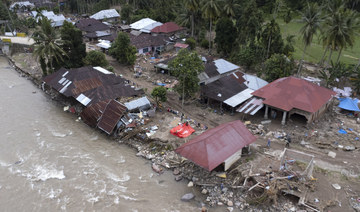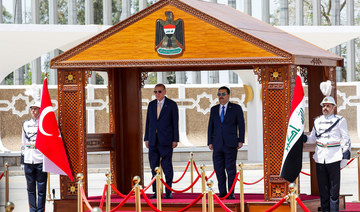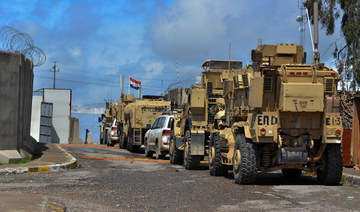ROME: Travel was restricted across Italy from Tuesday and public gatherings were forbidden throughout the country as the government signed off on strict quarantine measures to fight the spread of the new coronavirus.
Marriages and funerals were banned for more than three weeks and bars and restaurants were told to close at 6pm, with the prime minister urging people to “stay at home.”
The unprecedented measures, in place until April 3, were extended from several large areas of the north to Italy’s entire population of more than 60 million in a decree signed Monday night.
Since the COVID-19 disease first emerged in China late last year, Italy has become Europe’s hardest-hit country and has seen a rapid rise in cases to more than 9,000, with 463 deaths so far.
“All forms of gatherings in public places or sites open to the public” were banned, the decree said, while sporting events of all levels and disciplines were canceled — stopping play in the top-flight Serie A football league.
Under the new rules travel is only allowed for the most urgent work or health reasons, but people will be able to return to their own homes from elsewhere.
Schools and universities were closed, while businesses were urged to give their employees leave.
Bars and restaurants were only allowed to open between 6am and 6pm, the decree said, and only if it was possible to keep a distance of at least a meter between customers.
Religious institutions will also stay open, as long as people can stay the same distance from each other — but ceremonies such as marriages, baptisms and funerals are banned.
The measures extend a quarantine zone that Italy had imposed on Sunday for its industrial northern heartland around the cities of Milan and Venice.
“Today is our moment of responsibility. We cannot let our guard down,” Prime Minister Giuseppe Conte said in a dramatic evening television address before signing the latest decree.
“Everyone must give up something to protect the health of citizens,” he said, adding that the measures could be summarised as follows: I stay at home.”
However, it was not immediately clear how all the new rules would be enforced.
Trains and numerous flights had continued to operate into and out of Milan on Monday despite the earlier set of restrictions, which carried a fine of more than 200 euros ($230) for people who traveled without a valid reason.
Anyone who wishes to travel is now required to fill out a standardized form justifying their reasons and submit it to authorities at train stations and airports, as well as at major roads between cities.
Supermarkets open overnight in Rome and Naples were packed with residents stocking up on food as well as soap and disinfectant, Italian media reported.
Images showed people waiting calmly in queues outside the shops in the middle of the night, despite the government assuring that supermarkets will still be regularly restocked and asking Italians not to “go mad” with panic buying.
All ski resorts were out of action and cinemas, museums, nightclubs and similar venues must remain shut after being ordered to close their doors over the weekend, the decree said.
Only sports competitions organized by international bodies will be allowed to go ahead — but without spectators.
Italy has the world’s second oldest population after Japan, according to the World Bank, and older people appear to be more vulnerable to becoming severely ill with the new coronavirus.
Officials faced a further headache after prisoners fearful of infection protested or rioted in 23 jails across the country — leaving several dead.
Some prisoners have been asking to be granted amnesty over the health crisis.
The government’s first set of restrictions for Italy’s north sent the stock market into a tailspin that saw the Milan exchange lose more than 11 percent on the day.
But the expansion of the northern restrictions to the rest of the country just a day later suggests the government is struggling to cope with the scale of the medical emergency.
Italian health officials had warned on Saturday that the northern Lombardy region was starting to run out of hospital beds for its intensive care patients.
The government also began to recall retired doctors as part of an effort to quickly bolster the health service with 20,000 staff.
Italy limits travel and bans public gatherings across whole country
https://arab.news/63e7d
Italy limits travel and bans public gatherings across whole country
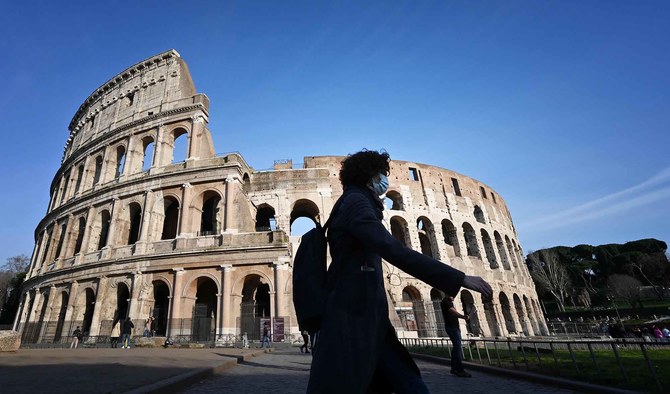
- Government signed off on strict quarantine measures to fight the spread of the new coronavirus
- Anyone wishing to travel is required to fill out a standardized form justifying their reasons
At least five migrants died during attempt to cross English Channel - La Voix du Nord
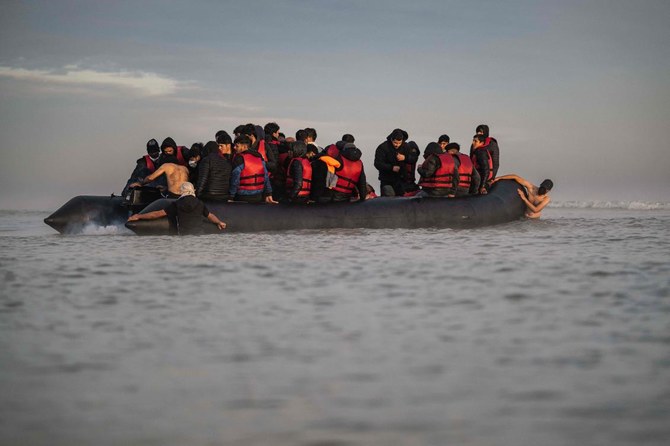
- People smugglers typically overload rickety dinghies, leaving them barely afloat and at risk of being lashed by the waves
The French coast guard confirmed there was a failed attempt to cross the Channel and said police were operating at a beach following the incident on Tuesday morning, adding there were several ‘lifeless bodies’.
Local police did not immediately reply to a Reuters request for comment.
The coast guard spokesperson said its agents were still operating at sea on Tuesday morning after what the official called a ‘busy’ morning, with several crossing attempts.
The Channel between France and Britain is one of the world’s busiest shipping lanes and currents are strong, making the crossing on small boats dangerous.
People smugglers typically overload rickety dinghies, leaving them barely afloat and at risk of being lashed by the waves as they try to reach British shores.
Asia hit hardest by climate, weather disasters in 2023— UN
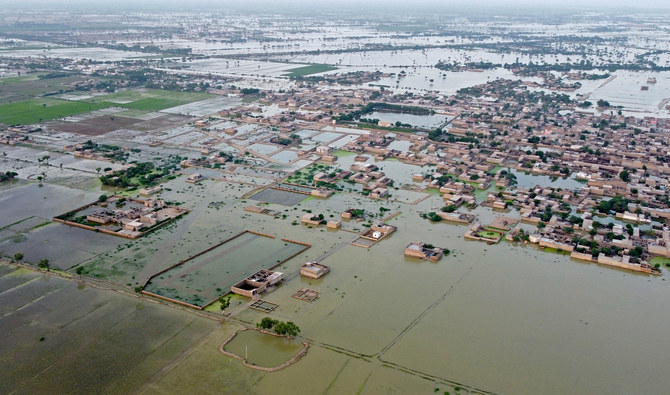
- Climate change exacerbated severity of weather disasters last year, sauys World Meteorological Organization
- 79 disasters, mostly floods and storms, associated with water-related weather hazards were reported in Asia in 2023
Geneva: Asia was the world’s most disaster-hit region from climate and weather hazards in 2023, the United Nations said Tuesday, with floods and storms the chief cause of casualties and economic losses.
Global temperatures hit record highs last year, and the UN’s weather and climate agency said Asia was warming at a particularly rapid pace.
The World Meteorological Organization said the impact of heatwaves in Asia was becoming more severe, with melting glaciers threatening the region’s future water security.
The WMO said Asia was warming faster than the global average, with temperatures last year nearly two degrees Celsius above the 1961 to 1990 average.
“The report’s conclusions are sobering,” WMO chief Celeste Saulo said in a statement.
“Many countries in the region experienced their hottest year on record in 2023, along with a barrage of extreme conditions, from droughts and heatwaves to floods and storms.
“Climate change exacerbated the frequency and severity of such events, profoundly impacting societies, economies, and, most importantly, human lives and the environment that we live in.”
The State of the Climate in Asia 2023 report highlighted the accelerating rate of key climate change indicators such as surface temperature, glacier retreat and sea level rise, saying they would have serious repercussions for societies, economies and ecosystems in the region.
“Asia remained the world’s most disaster-hit region from weather, climate and water-related hazards in 2023,” the WMO said.
The annual mean near-surface temperature over Asia in 2023 was the second highest on record, at 0.91 degrees Celsius above the 1991-2020 average, and 1.87 C above the 1961-1990 average.
Particularly high average temperatures were recorded from western Siberia to central Asia, and from eastern China to Japan, the report said, with Japan having its hottest summer on record.
As for precipitation, it was below normal in the Himalayas and in the Hindu Kush mountain range in Pakistan and Afghanistan.
Meanwhile southwest China suffered from a drought, with below-normal precipitation levels in nearly every month of the year.
The High-Mountain Asia region, centered on the Tibetan Plateau, contains the largest volume of ice outside of the polar regions.
Over the last several decades, most of these glaciers have been retreating, and at an accelerating rate, the WMO said, with 20 out of 22 monitored glaciers in the region showing continued mass loss last year.
The report said 2023 sea-surface temperatures in the northwest Pacific Ocean were the highest on record.
Last year, 79 disasters associated with water-related weather hazards were reported in Asia. Of those, more than 80 percent were floods and storms, with more than 2,000 deaths and nine million people directly affected.
“Floods were the leading cause of death in reported events in 2023 by a substantial margin,” the WMO said, noting the continuing high level of vulnerability of Asia to natural hazard events.
Hong Kong recorded 158.1 millimeters of rainfall in one hour on September 7 — the highest since records began in 1884, as a result of a typhoon.
The WMO said there was an urgent need for national weather services across the region to improve tailored information to officials working on reducing disaster risks.
“It is imperative that our actions and strategies mirror the urgency of these times,” said Saulo.
“Reducing greenhouse gas emissions and adapting to the evolving climate is not merely an option, but a fundamental necessity.”
UN officials urge UK to reconsider plan to transfer asylum seekers to Rwanda

- UN called on the UK to instead take practical measures to address irregular flows of migrants and refugees
GENEVA: Two United Nations top officials on Tuesday called on the UK to reconsider its plan to transfer asylum seekers to Rwanda, warning the move would have a harmful impact on human rights and refugee protection.
In a joint statement, Filippo Grandi, the UN High Commissioner for Refugees, and Volker Turk, the UN High Commissioner for Human Rights, called on the UK to instead take practical measures to address irregular flows of migrants and refugees.
British Prime Minister Rishi Sunak promised on Monday to start sending asylum seekers to Rwanda within 10 to 12 weeks as the upper house of parliament passed legislation that had been delayed for weeks by attempts to alter the plan.
Asia hit hardest by climate, weather disasters in 2023:UN
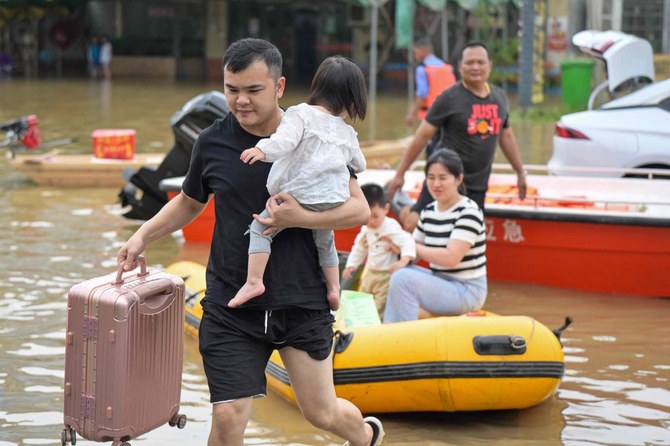
- UN’s weather and climate agency said Asia was warming at a particularly rapid pace
GENEVA: Asia was the world’s most disaster-hit region from climate and weather hazards in 2023, the United Nations said Tuesday, with floods and storms the chief cause of casualties and economic losses.
Global temperatures hit record highs last year, and the UN’s weather and climate agency said Asia was warming at a particularly rapid pace.
The World Meteorological Organization said the impact of heatwaves in Asia was becoming more severe, with melting glaciers threatening the region’s future water security.
The WMO said Asia was warming faster than the global average, with temperatures last year nearly two degrees Celsius above the 1961 to 1990 average.
“The report’s conclusions are sobering,” WMO chief Celeste Saulo said in a statement.
“Many countries in the region experienced their hottest year on record in 2023, along with a barrage of extreme conditions, from droughts and heatwaves to floods and storms.
“Climate change exacerbated the frequency and severity of such events, profoundly impacting societies, economies, and, most importantly, human lives and the environment that we live in.”
The State of the Climate in Asia 2023 report highlighted the accelerating rate of key climate change indicators such as surface temperature, glacier retreat and sea level rise, saying they would have serious repercussions for societies, economies and ecosystems in the region.
“Asia remained the world’s most disaster-hit region from weather, climate and water-related hazards in 2023,” the WMO said.
Ranging disasters
The annual mean near-surface temperature over Asia in 2023 was the second highest on record, at 0.91 degrees Celsius above the 1991-2020 average, and 1.87 C above the 1961-1990 average.
Particularly high average temperatures were recorded from western Siberia to central Asia, and from eastern China to Japan, the report said, with Japan having its hottest summer on record.
As for precipitation, it was below normal in the Himalayas and in the Hindu Kush mountain range in Pakistan and Afghanistan.
Meanwhile southwest China suffered from a drought, with below-normal precipitation levels in nearly every month of the year.
The High-Mountain Asia region, centered on the Tibetan Plateau, contains the largest volume of ice outside of the polar regions.
Over the last several decades, most of these glaciers have been retreating, and at an accelerating rate, the WMO said, with 20 out of 22 monitored glaciers in the region showing continued mass loss last year.
The report said 2023 sea-surface temperatures in the northwest Pacific Ocean were the highest on record.
Water-related hazards
Last year, 79 disasters associated with water-related weather hazards were reported in Asia. Of those, more than 80 percent were floods and storms, with more than 2,000 deaths and nine million people directly affected.
“Floods were the leading cause of death in reported events in 2023 by a substantial margin,” the WMO said, noting the continuing high level of vulnerability of Asia to natural hazard events.
Hong Kong recorded 158.1 millimeters of rainfall in one hour on September 7 — the highest since records began in 1884, as a result of a typhoon.
The WMO said there was an urgent need for national weather services across the region to improve tailored information to officials working on reducing disaster risks.
“It is imperative that our actions and strategies mirror the urgency of these times,” said Saulo.
“Reducing greenhouse gas emissions and adapting to the evolving climate is not merely an option, but a fundamental necessity.”
Jury deliberating in Iraq Abu Ghraib prison abuse civil case; contractor casts blame on Army

- Raisi said the killings by Israel in Gaza were being committed with the support of the United States and other Western countries
ALEXANDRIA, Virginia: A lawyer for the military contractor being sued by three survivors of the notorious Abu Ghraib prison in Iraq told jurors Monday that the plaintiffs are suing the wrong people.
“If you believe they were abused ... tell them to make their claim against the US government,” said John O’Connor, defense attorney for Reston, Virginia-based military contractor CACI, during closing arguments at the civil trial in federal court. “Why didn’t they sue the people who actively abused them?”
The lawsuit brought by the three former Abu Ghraib detainees marks the first time a US jury has weighed claims of abuse at the prison, which was the site of a worldwide scandal 20 years ago when photos became public showing US soldiers smiling as they inflicted abusive and humiliating treatment on detainees in the months after the US invasion and occupation of Iraq.
The suit alleges that civilian interrogators supplied by CACI to Abu Ghraib contributed to the torture the plaintiffs by conspiring with military police to “soften up” detainees for interrogations.
CACI, in its closing arguments, relied in part on a legal theory known as the “borrowed servant doctrine,” which states an employer can’t be liable for its employees’ conduct if another entity is controlling and directing those employees’ work.
In this case, CACI says the Army was directing and controlling its employees in their work as interrogators.
Lawyers for the plaintiffs disputed that CACI relinquished control of its interrogators to the Army. At trial, they introduced evidence that CACI’s contract with the Army required CACI to supervise its own employees. Jurors also saw a section of the Army Field Manual that pertains to contractors and states that “only contractors may supervise and give direction to their employees.
Muhammad Faridi, one of the plaintiffs’ lawyers, told jurors that the case is simpler than CACI’s lawyers are trying to make it.
He said that if CACI interrogators conspired with military police to inflict abuse on detainees to soften them up for interrogations, then the jury can find CACI liable even if CACI interrogators never themselves inflicted abuse on any of the three plaintiffs.
All three plaintiffs testified to horrible treatment including beatings, sexual assaults, being threatened with dogs and forced to wear women’s underwear, but said the abuse was either inflicted by soldiers, or by civilians who couldn’t be identified as CACI workers. In some cases, the detainees said they couldn’t see who was abusing them because they had bags over their heads.
As evidence of CACI’s complicity, jurors heard testimony from two retired generals who investigated the Abu Ghraib scandal in 2004; both concluded that CACI interrogators engaged in misconduct.
Faridi told the jury that while many of the soldiers who abused detainees were convicted and sentenced to prison, CACI has not yet been held accountable.
“When our country’s military found out about the abuse, they didn’t cover it up,” Faridi said. “Our country’s military held the military police members who were perpetrating the abuse accountable. CACI escaped liability.”
And Faridi said that even when the Army asked CACI to hold its its interrogators responsible, it still sought to evade responsibility. In May 2004, the Army asked CACI to fire one of its interrogators, Dan Johnson, after one of the Abu Ghraib photos showed Johnson interrogating a detainee who was forced into an awkward crouching position that investigators concluded was an illegal stress position.
CACI contested Johnson’s dismissal, writing that the “photo depicts what appears to be a relatively relaxed scene” and saying that “squatting is common and unremarkable among Iraqis.”
“I’ll leave that to you to consider whether you find that offensive,” Faridi told the jury Monday.
At trial, CACI employees testified they defended Johnson’s work because Army personnel had asked them through back channels to do so. O’Connor said that out of the many hundreds of photos of abuse at Abu Ghraib, the photo of Johnson is the only one depicting a CACI employee, and it shows him questioning not one of the plaintiffs but an Iraqi policeman after someone had smuggled a gun into the prison and shot at military police.
O’Connor also apologized for parts of his case that were “long, annoying and boring” but said he had no choice because the US government claimed that some evidence, including the identities of interrogators, was classified. So jurors, rather than hearing live testimony, were subjected to long audio recordings in which the interrogators’ voices were doctored and their answers were often interrupted by government lawyers who instructed them to not answer the question.
The trial was delayed by more than 15 years of legal wrangling and questions over whether CACI could be sued. Some of the debate focused on the question of immunity — there had long been an assumption that the US government would hold sovereign immunity from a civil suit, and CACI argued that, as a government contractor, it would enjoy derivative immunity.
But US District Judge Leonie Brinkema, in a first-of-its-kind ruling, determined that the US government cannot claim immunity in cases involving fundamental violations of international norms, such as torture allegations. And, as a result, CACI could not claim any kind of derivative immunity, either.
The eight-person jury deliberated about three hours before pausing Monday afternoon without reaching a verdict. Deliberations are set to resume Wednesday.






